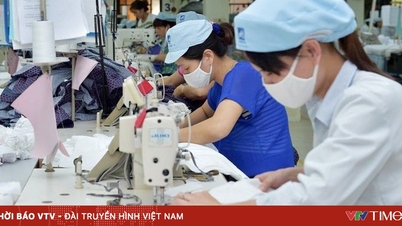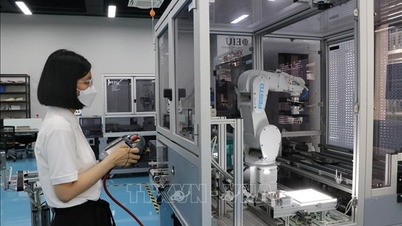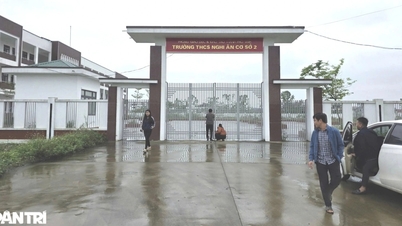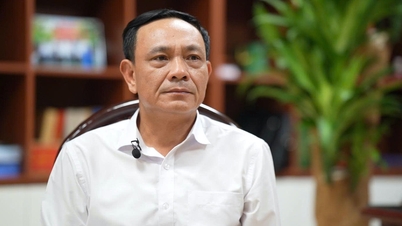National Assembly delegate, Professor Nguyen Thien Nhan (HCMC), said that to maintain double-digit GDP growth, Vietnam needs to expand its workforce by gradually increasing the retirement age to 65. On the contrary, Professor Giang Thanh Long (National Economics University) emphasized that instead of extending working hours, improving the quality of young workers is the sustainable direction.
Two different perspectives but aiming at the same goal: ensuring economic resilience in the context of a rapidly aging population.

Vietnam is in its golden population period, with more than half of the population under 35 years old.
Photo: Ngoc Duong
The technical expertise of young workers is still low.
Raising the retirement age can help maintain the size of the workforce, especially in the highly educated group. People over 60 still have health, experience, and valuable management skills - a "living knowledge base" that the economy cannot replace immediately. In fields such as health, education , research, or technology, retaining good people for a few more years means retaining an important intellectual resource.
However, this policy also shows its limits when the average working age increases, reducing the ability to adapt to technology and innovate. In the era of artificial intelligence and digital transformation, extending the working age too much can create a "placekeeping paradox", reducing the opportunities of the younger generation, a force that learns and innovates faster.
In fact, according to the General Statistics Office, in the third quarter of 2025, Vietnam had 1.6 million young people aged 15-24 who were not studying or working, accounting for 11.5% of the total youth population. Technical expertise was also low: in 2024, only 26.4% of people aged 15 and over had professional degrees, of which college and university degrees or higher accounted for only 15.5%.
The above situation has affected labor productivity. Data from the General Statistics Office shows that in 2023, Vietnam's labor productivity will be only 11.4% of Singapore, 35.5% of Malaysia and 65% of Thailand.
With a large but inefficient workforce, to achieve high growth, Vietnam cannot just "do more" but must "do smarter" by investing heavily in education, digital skills, vocational training and university training.
Improving productivity and quality of young workers is a long-term strategy.
Resolution 71 of the Politburo clearly defined the target that by 2030, 24% of the workforce will have college or university degrees or higher, and at least 35% will study basic sciences, engineering, and technology. technology, including 6,000 postgraduate students and 20,000 talented program students. This is a big challenge, but also demonstrates strong political determination to build a generation of young workers with the capacity to compete globally.

To sustainably improve the quality of young labor, it is necessary to invest heavily in education, vocational training, universities and innovation.
Photo: Nhat Thinh
Vietnam is in a period of golden population, with more than half of the population under 35 years old. If this period is not taken advantage of to invest in the younger generation, the "golden population period" will quickly end as the aging population accelerates. Therefore, increasing the retirement age is only a temporary solution, while improving the productivity and quality of young workers is the long-term strategy.
The two options of "increasing the retirement age" and "improving the quality of young workers" should not be mutually exclusive. The issue is not whether to increase it, but how to increase it and the accompanying reforms.
Many countries have adopted flexible policies: those working in the intellectual, research, education, and medical fields can extend their working time; while those working in heavy labor or in toxic environments can retire early but still ensure their insurance benefits. At the same time, it is necessary to expand opportunities for older people to continue contributing in the role of advisor, guide, researcher or trainer. This approach helps to promote valuable experience, reduce waste of resources and avoid "place-keeping" conflicts between generations.
It is necessary to create an environment for young people to learn, innovate and assert their abilities. When empowered and working in an innovative space, they not only inherit but can also surpass the previous generation. Education and training policies need to go ahead: promoting connectivity between general education, vocational training and university; closely linking the state - school - enterprise - locality; developing digital skills, foreign languages, and industrial style.
Along with that, the social security and insurance system must be adjusted to both encourage the elderly to continue working and open up more opportunities for the young. Vietnam needs to choose a more difficult, more sustainable path: investing heavily in education, vocational training, universities and innovation. Because increasing the retirement age only "prolongs the strength", while investing in the youth will help the country "breakthrough and be sustainable". Growth does not only come from the number of workers but from productivity, knowledge and skills - the strength of a young generation confidently entering the era of growth.
Source: https://thanhnien.vn/tang-tuoi-nghi-huu-hay-nang-chat-luong-lao-dong-tre-185251103103858478.htm


![[Photo] Ho Chi Minh City Youth Take Action for a Cleaner Environment](https://vphoto.vietnam.vn/thumb/1200x675/vietnam/resource/IMAGE/2025/11/04/1762233574890_550816358-1108586934787014-6430522970717297480-n-1-jpg.webp)

![[Photo] The road connecting Dong Nai with Ho Chi Minh City is still unfinished after 5 years of construction.](https://vphoto.vietnam.vn/thumb/1200x675/vietnam/resource/IMAGE/2025/11/04/1762241675985_ndo_br_dji-20251104104418-0635-d-resize-1295-jpg.webp)
![[Photo] Comrade Nguyen Duy Ngoc holds the position of Secretary of the Hanoi Party Committee](https://vphoto.vietnam.vn/thumb/1200x675/vietnam/resource/IMAGE/2025/11/04/1762234472658_a1-bnd-5518-8538-jpg.webp)

![[Photo] Ca Mau "struggling" to cope with the highest tide of the year, forecast to exceed alert level 3](https://vphoto.vietnam.vn/thumb/1200x675/vietnam/resource/IMAGE/2025/11/04/1762235371445_ndo_br_trieu-cuong-2-6486-jpg.webp)





































































































Comment (0)